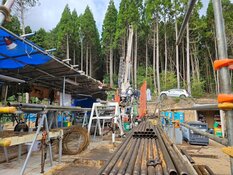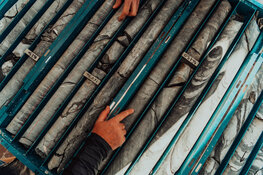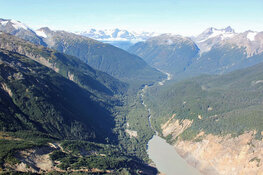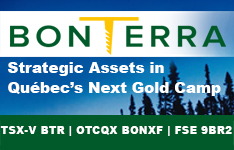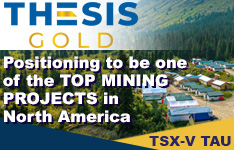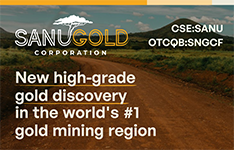James West: It's definitely not as objective as it was once. I'm very biased toward the companies I choose to cover because I am invested in them, my retail subscribers are invested in them and now my institutional clients are invested in them. But the caveat is that the companies are now beholden to me—not vice versa—because if they don't deliver on what they represent, I will ensure that the whole world knows about that.
TGR: You're developing a Midas brand. Earlier this year, you were forming the Midas Letter Gold Capitalization Fund, which will lend companies capital to bring gold and silver projects into production.
JW: We are continuing to develop infrastructure and partnerships with other entities that can provide the financing-engineering component. For this fund, the money is not really the hard part. There are a lot of funds that are going from company to company and saying, "We'll lend you some money in exchange for a portion of your offtake." Everybody's trying to capitalize on the commodity-stream model.
The difficulty is in identifying the companies to extend those loans to. Companies don't want to do deals in these conditions because the terms are too onerous. The guy with the money is able to drive a hard bargain because the market is weak.
The fund continues to evolve, but it's still a ways off yet. The state of the market is such that there is a lot of wait-and-see going on.
TGR: The royalty model has worked well for Royal Gold Inc. (RGLD:NASDAQ), Franco-Nevada Corp. (FNV:TSX) and Silver Wheaton Corp. (SLW:NYSE). Sandstorm Gold Ltd. (SSL:TSX.V) is now taking the same path. Will too many companies in that space kill the model? If these companies start competing too much, the margins could disappear.
JW: That is largely why the fund is essentially on hold. There are all these firms trying to throw money at various gold deals. Most of the companies are saying, "No, your financing is attractive, but you're looking to encumber our asset." They want a portion of the offtake, a warrant kicker, a negotiable conversion rate and they want to be the first creditor on the asset. The gold in the ground is not going anywhere. It's only growing in value. But companies are going to start running out of money soon and there will be bargain-basement prices in equity financings. That is going to make debt financings more attractive.
TGR: Most pundits think gold is headed lower before it heads higher. The markets would seem to agree. What's your outlook for gold?
JW: I have unrestrained bullishness for the future of the gold price. I look at the 10-year picture: Gold has increased every year by 21%, and 2011 is no exception. Let's take the well-known pundit Dennis Gartman, who said on CNBC this week that he has completely exited his gold positions because he thinks gold is going to $1,450 an ounce (oz). If you were to look at all of the times that he has gone on CNBC and said that. . .anytime I hear Dennis Gartman say it's time to sell, that's when I start buying gold again! When he says he's bullish on gold, he's trying to catch a falling knife. He has done that repeatedly in the five years that I've been tracking those statements. He must have very bloody hands and no fingers left because he is consistently wrong.
TGR: You share Eric Sprott's perspective on silver, which is to say there is roughly 16 times more silver in the ground than gold, thus the silver price will eventually reach one-sixteenth the price of gold. Sprott recently said that silver-producing companies should withhold a portion of their production rather than sell it for cash that just sits in banks and depreciates. What do you make of his statement?
JW: Every company that produces silver should hold it on the balance sheet as opposed to cash. It's the smart thing to do. If you subscribe to the ideas that the gold:silver price is going to be 16:1 and precious metals have nowhere to go but up because of the debasement of currencies in growing numbers of sovereign jurisdictions, it makes perfect sense.
TGR: Nonetheless, silver companies measure their profits in dollars.
JW: If a company has silver on its balance sheet, then it should be able to count that as part of a liquid-asset holding denominated in dollars.
TGR: There's not an analyst on the Street that wouldn't significantly discount a company's silver holdings given that if it liquidated them all at once that would drive the silver price down.
JW: I agree that there are few analysts who would not penalize a company for that. However, some analysts, and I think they're the most credible analysts, would actually give the company a premium for such thinking. What that demonstrates to me is a flaw in the thinking of most analysts. It's a deficiency in generally accepted accounting practices. In the future, we'll look back to this point in history and say, "Boy, were we ever dumb back then." We should be valuing gold as money. It should be valued at a premium to cash on the balance sheet, as should silver. Analysts should value those companies accordingly. It's not conventional wisdom. However, I believe that one day it will be and that it's a superior analytical perspective.
TGR: What's your outlook for silver?
JW: Its price is going to be one-sixteenth of the gold price so it's already undervalued by at least two-thirds. Gold and silver are both going to continue to appreciate. I agree with Sprott when he says that silver is going to outperform gold.
TGR: What companies in northern Ontario's Red Lake gold camp do you find interesting right now?
JW: Confederation Minerals Ltd. (CFM:TSX.V), Prodigy Gold Inc. (PDG:TSX.V) and, just outside of Red Lake, Foundation Resources Inc. (FDN:TSX.V). Foundation has recently become a top pick in that region because it has 860,000 ounces (oz) gold and an NI 43-101 valued at $5.80/oz in the ground based on its share price. It's just a spectacular opportunity.
TGR: Prodigy put out a new resource estimate on its Magino project Nov. 2 that said there's about 55% more gold there than previously thought. What are your thoughts on that project?
JW: We hold Prodigy in the fund and I continue to follow it. That new resource certainly demonstrates the deposit is growing. It's still open in multiple directions. The company is aggressively developing it. The market hasn't been kind to Prodigy, but Prodigy is absolutely one to hold because it's an excellent opportunity at a great price.
TGR: What stands out about Confederation?
JW: Confederation is really interesting. Its joint-venture partner on the Newman Todd project is Redstar Gold Corp. (RGC:TSX.V), which holds 30%. Think about this: The company that owns 30% is valued at $50 million (M), but the company that owns 70% is valued at $17M. Redstar's other projects are not really interesting projects. I've got to assume that its share-price valuation is based on Newman Todd. There's very little risk of this not becoming a mine. We're headed toward an era similar to 2008 where the prices are astronomically low. Fortunes are going to be made in the years ahead by the people who were smart enough to pick up these high-caliber deals at super low prices.
TGR: Let's head to Nevada. You follow a couple of companies there, including Scorpio Gold Corp. (SGN:TSX.V) and Meadow Bay Gold Corp. (MAY:TSX.V; MAYGF:OTCQX). What's Scorpio's horoscope?
JW: Scorpio is going to be an absolute home run. Peter Hawley, who heads the company, has a great track record and is well regarded. If anyone can drive this thing forward, it's him. But really, all an investor needs to look at is the most recent intercepts: 24 meters (m) grading 5.9 grams per ton (g/t), 3m grading 15 g/t. It looks to be a major discovery—a winner.
TGR: What were your impressions of the recent drill results from Meadow Bay's Atlanta Gold Mine project where there was one intercept of roughly 20m of 3.5 grams gold equivalent?
JW: Meadow Bay is a fault-controlled system. Everywhere along the fault, which has been traced north to 5 kilometers (km), has 20–40m intercepts grading 1–3 g/t gold. That should take the company to more than 1 Moz in the near term. There are two giant porphyries, one of which was the 60m intercept grading just over 1 g/t gold and copper, as well as this new one. The potential for Meadow Bay with these two porphyries, as well as the fault-controlled system, which continues to be open to depth to the north and south, is very interesting. The potential is certainly multiple million ounces.
TGR: Does it have enough cash to ride out the storm that might be coming to the financial sector?
JW: It has about $3M in the bank, but it has one drill on the ground now so it doesn't need to raise any money for at least three years. One drill can move all over the place and demonstrate a lot of potential.
TGR: Let's move to Latin America where you've had a lot of success stock picking. The Midas Letter Opportunity Fund has a position in Newstrike Capital Inc. (NES:TSX.V), which is developing the Ana Paula project in Mexico.
JW: Ana Paula is an astonishingly fantastic deposit. It seems like at least once every two months it puts out a new intercept. The most spectacular intercept on Nov. 23 was 135.5m grading 5 g/t and 75m grading 4 g/t. It has had other jaw-dropping intercepts. It's the gift that keeps on giving. The share price is not reflecting the immensity of the potential largely because there is no resource calculation. When the resource calculation comes out by the end of the first quarter of 2012, Newstrike will start to see the valuations it deserves.
TGR: Newstrike's burn rate was about $820,000/month through the first eight months of 2011, according to an investor presentation. How long can it last before it has to do another financing?
JW: The company had $19M in liquid assets recently, so it will be late 2013 before it runs out of money. Newstrike will likely see how the market responds to its resource calculation and what the market conditions are at that time. If it's getting the valuation that it deserves then it could do a financing. The company won't wait until it is at $0 to raise money, but it's certainly not going to do it at these valuations.
TGR: Ana Paula certainly seems to have massive open-pit potential. Are there others that you would compare to this?
JW: I would compare it to Ventana Gold Corp. (VEN:TSX) in terms of performance. It's got all the earmarks of a super high-grade deposit.
TGR: There's another company further south called Corazon Gold Corp. (CGW:TSX.V). What can you tell us about them?
JW: Corazon raised a pile of money at a great price. It has some of the best funds in Canada and the U.S. involved. It has drilled about 40 holes and hit some good intercepts of up to 20 g/t at the Santo Domingo project in Nicaragua. But it didn't hit what the market wanted to see, so there was a major sell off. The company's stock went from a high of $1.16 down to $0.18.
It just started a phase-two drilling program. I regard it as one of the most promising companies out there because it's on the same geology and vein system as B2Gold Corp.'s (BTO:TSX; BGLPF:OTCQX) La Libertad project. La Libertad just intersected a new vein called Jabali, which has added another five years of mine life. It's high grade, rich and large. If Corazon Gold is on the same geology, how likely is it that a similar vein as the Jabali is going to be discovered on the Santo Domingo project? The potential is very high. Given the price, it's a great entry point. It's very well cashed-up with $7M in the bank. It's one that I own personally and that I watch with a bit of excitement.
TGR: What do you know about Corazon President and CEO Patrick Brauckmann? He seems rather new to the space.
JW: He's new to the space, but he's had corporate success in the technology sector in the past. He's surrounded himself with geologic rock stars, including Dr. Carl Hering as principal geological consultant, who has a long history in Nicaragua.
Brauckmann also has Lockwood Financial behind him. Those guys are deep pockets that tend to support a stock long term. When they get behind a stock, they can make the stock move. He's surrounded by people that can get him where he needs to go in the mining space.
TGR: Are there any other companies you're intrigued by right now?
JW: I own one million shares of Hunter Bay Minerals Plc (HBY:TSX.V) because I'm particularly fond of it. I'm so fond of Hunter Bay because it's headed by Dr. Chris Wilson, head geologist for Ivanhoe Mines Ltd. (IVN:TSX; IVN:NYSE) when Oyu Tolgoi in Mongolia, arguably the world's largest copper-gold system under development presently, was discovered. Since he's been out on his own, he's been looking at other people's projects. He's been a consulting geologist for SRK Consulting and he's written a lot of NI 43-101s.
What's got Wilson excited about Hunter Bay is its Sela Creek Deposit in Suriname. Sela Creek is one of the last great, unexplored greenstone belts in the world and it's near to IAMGOLD Corp.'s (IMG:TSX; IAG:NYSE) 14 Moz Rosebel mine. Channel sampling and all of the geophysical work that Wilson and his team have done at Hunter Bay indicate that this could be another Rosebel. The valuation of the company versus the potential—it's an outstanding entry-level play. It's my biggest position and one that I'm most bullish on.
TGR: It's a name I don't think many people have heard of.
JW: That's another reason I like it.
TGR: You're often ostentatious and outspoken, which are just some of the reasons we like to talk with you. In an interview with BNN last month, you said investors often have the attention span of "gnats." What did you mean by that?
JW: How many substantial financial crises have there been since the late 1980s? Probably six? In that timeframe, one should become accustomed to the idea that markets go up and down, sometimes drastically. As soon as investors see a market that goes down by 10–15%, such as recently, they dump everything. A successful investor cannot focus on a short time horizon. It is possible to have some success as a short-term trader, but ultimately it's like Las Vegas—the house always wins. To win in resource investing, take a long view and set an agenda.
For example, say I buy Newstrike at $2.40 because I believe there is going to be 5–10 Moz there and the company will justify a valuation of roughly five times of what I paid for it. Then I am going to give it five years and I'm going to hang onto it. I'm not even going to look at the daily trading because that's irrelevant. In five years, when it has proved up and it is heading into production, I'm going to sell it. As opposed to jumping in and out of a stock and trying to catch a falling knife. Don't let short-term volatility inform investment decisions.
TGR: That is very good advice. Thanks.
Midas Letter is the Journal of Investment Strategy of the Midas Letter Opportunity Fund, a Luxembourg-based Special Investment Fund that specializes in Canadian-listed emerging companies in the resource sector with a focus on precious metals explorers and miners. James West is the portfolio and investment advisor to the fund. Every month, West's Midas Letter Premium Edition deconstructs the economic and political events of the past and upcoming week, and identifies risks and opportunities to investors seeking to profit while the majority of investors are losing money.
Want to read more exclusive Gold Report interviews like this? Sign up for our free e-newsletter, and you'll learn when new articles have been published. To see a list of recent interviews with industry analysts and commentators, visit our Exclusive Interviews page.
DISCLOSURE:
1) Brian Sylvester of The Gold Report conducted this interview. He personally and/or his family own shares of the following companies mentioned in this interview: None.
2) The following companies mentioned in the interview are sponsors of The Gold Report: B2Gold Corp., Corazon Gold Corp., Franco-Nevada Corp., Gold Canyon Resources Inc., Meadow Bay Gold Corp., Newstrike Capital Inc., Prodigy Gold Inc., Scorpio Gold Corp. Streetwise Reports does not accept stock in exchange for services.
3) James West: I personally and/or my family own shares of the following companies mentioned in this interview: Hunter Bay Minerals Plc, Corazon Gold Corp., Newstrike Capital Inc., Meadow Bay Gold Corp. I personally and/or my family am paid by the following companies mentioned in this interview: None. I was not paid by Streetwise for participating in this story.


